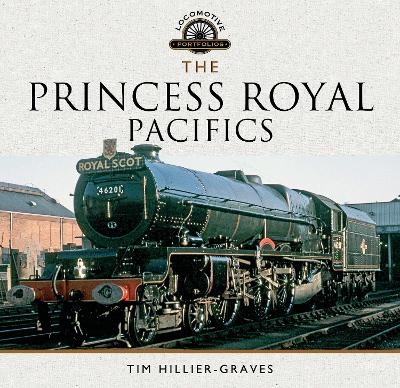
The Princess Royal Pacifics
Seiten
2018
Pen & Sword Transport (Verlag)
978-1-4738-8578-3 (ISBN)
Pen & Sword Transport (Verlag)
978-1-4738-8578-3 (ISBN)
Covers All Members of the Class
When Stanier joined the LMS in 1932, as their CME, he was expected to breathe new life into this ailing giant. Since its formation it had steadily lost ground to its main rival, the LNER. In Doncaster, Nigel Gresley and his team, with an eye to advancing locomotive design at the same time as making the company commercially successful, had quickly begun producing a series of high performance and iconic Pacific engines to pull their high profile express trains. Their impact left the LMS trailing in their wake. Under previous CMEs, the LMS had concentrated on 4-6-0 designs to pull their express services, but many felt they lacked sufficient power and had little to offer in performance or glamour when compared to their rivals. Stanier, heavily influenced by his mentor, George Churchward, his work on the GWR and the potential of the Pacific design, saw such a class as essential to the success of the LMS. And so the Princess Royal Class came into being, against a background of some opposition and cultural differences. Despite this, they proved their worth and became popular with their crew and managers.
Within a few short years, however, their premier position in the company had been taken by a very worthy successor, the Princess Coronation Class. Overshadowed and often overlooked, they tend to be seen as a stepping stone to something better. Yet, in reality they stand up well to the closest scrutiny, and this book tells the story of these engines through the eyes of those who came into contact with them. They also best represent the impact William Stanier had on locomotive design and best describe the way he changed the culture of the LMS to allow it to grow successfully. It is a story of great endeavor and courage that can only be told by revealing and discussing political, social, economic and engineering issues.
When Stanier joined the LMS in 1932, as their CME, he was expected to breathe new life into this ailing giant. Since its formation it had steadily lost ground to its main rival, the LNER. In Doncaster, Nigel Gresley and his team, with an eye to advancing locomotive design at the same time as making the company commercially successful, had quickly begun producing a series of high performance and iconic Pacific engines to pull their high profile express trains. Their impact left the LMS trailing in their wake. Under previous CMEs, the LMS had concentrated on 4-6-0 designs to pull their express services, but many felt they lacked sufficient power and had little to offer in performance or glamour when compared to their rivals. Stanier, heavily influenced by his mentor, George Churchward, his work on the GWR and the potential of the Pacific design, saw such a class as essential to the success of the LMS. And so the Princess Royal Class came into being, against a background of some opposition and cultural differences. Despite this, they proved their worth and became popular with their crew and managers.
Within a few short years, however, their premier position in the company had been taken by a very worthy successor, the Princess Coronation Class. Overshadowed and often overlooked, they tend to be seen as a stepping stone to something better. Yet, in reality they stand up well to the closest scrutiny, and this book tells the story of these engines through the eyes of those who came into contact with them. They also best represent the impact William Stanier had on locomotive design and best describe the way he changed the culture of the LMS to allow it to grow successfully. It is a story of great endeavor and courage that can only be told by revealing and discussing political, social, economic and engineering issues.
Tim Hillier-Graves was born in North London in 1951/. From an early age he was fascinated by steam locomotives. In 1972, Tim joined the Navy Department of the MOD and saw wide service in many locations. He retired in 2011, having specialised in Human Resource Management, then the management of the MOD's huge housing stock as one of the department's Assistant Directors for Housing. On the death of his uncle in 1984, he became the custodian of a substantial railway collection and in retirement has spent considerable time reviewing and cataloguing this material. 'The Turbomotive, Staniers Advanced Pacific' is the first result of this work.
| Erscheinungsdatum | 13.06.2018 |
|---|---|
| Zusatzinfo | 200 colour & black and white photographs, weight diagrams and engineers drawings and period adverts |
| Verlagsort | Barnsley |
| Sprache | englisch |
| Maße | 250 x 240 mm |
| Themenwelt | Natur / Technik ► Fahrzeuge / Flugzeuge / Schiffe ► Schienenfahrzeuge |
| ISBN-10 | 1-4738-8578-7 / 1473885787 |
| ISBN-13 | 978-1-4738-8578-3 / 9781473885783 |
| Zustand | Neuware |
| Haben Sie eine Frage zum Produkt? |
Mehr entdecken
aus dem Bereich
aus dem Bereich
St. Moritz – Zermatt : die Traumreise im langsamsten Schnellzug der …
Buch | Hardcover (2023)
Verlag Berg & Tal
CHF 25,90
Betriebsmaschinendienst, Einsatz bei den Bahnbetriebswerken und …
Buch | Hardcover (2024)
EK-Verlag
CHF 68,90
Buch | Hardcover (2023)
GeraMond (Verlag)
CHF 41,90


